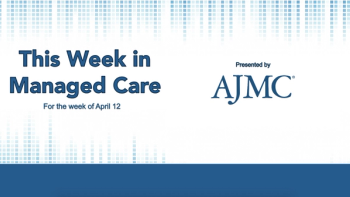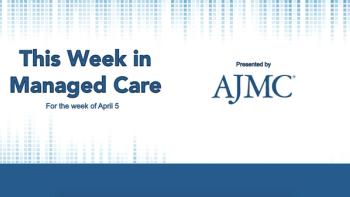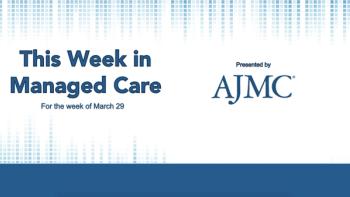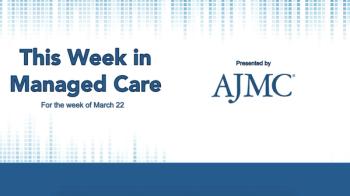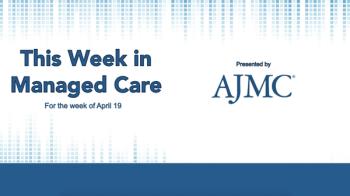
This Week in Managed Care: January 15, 2021
This week, the top managed care news included new CDC guidance to base state COVID-19 vaccine supply on administration rates; a report finds record drop in cancer mortality but persistent disparities; Jardiance moves 1 step closer to FDA approval for use in heart failure.
New CDC guidance to base state COVID-19 vaccine supply on administration rates, report finds record drop in cancer mortality but persistent disparities, and Jardiance moves 1 step closer to FDA approval for use in heart failure.
Welcome to This Week in Managed Care, I’m Matthew Gavidia.
New CDC Guidance to Base State COVID-19 Vaccine Supply on Administration Rates
This week, HHS Secretary Alex Azar said that starting in 2 weeks, allocation of COVID-19 vaccines will be based on the percentage of doses each state has successfully administered thus far and the number of residents aged 65 and older.
“In order to ensure doses are being put to use and put to use for the most vulnerable, we will be allocating them based on the pace of administration as reported by states,” Azar said. “We're giving states 2 weeks’ notice of this shift to give them the time necessary to plan and to improve their reporting if they think their data is faulty.”
The new methodology aims to serve as an incentive for states to increase the speed and accessibility of available vaccines, as some states have reported significant roadblocks hindering rollout.
Because older Americans and those with comorbidities, in addition to health care and front-line workers, have a higher risk of contracting COVID-19 and suffering severe complications, the CDC’s Advisory Committee on Immunization Practices recommended these populations be the first to receive immunizations.
However, many states have implemented their own, more stringent guidelines, which have reportedly resulted in millions of vaccine doses piling up in freezers or being thrown out. Currently, some jurisdictions have reported they administered less than 15% of vaccines allocated while others report over 80% administration.
In addition to the new guidelines, the next phase of allocation expands the groups who can get vaccinated and sees the entire US supply of vaccines being made available immediately, as opposed to reserving doses for second administrations. This approach ensures there will be a second dose available for every person who receives a first dose, Azar said.
Thus far, nearly 25 million first doses of either the Pfizer/BioNTech or Moderna vaccine have been made available for states to distribute. As President-elect Joe Biden is set to take office next week, the officials said Biden's team will be briefed on the vaccine allocation changes.
For more,
ACS Cancer Statistics Report Shows Record Drop in Cancer Mortality but Persistent Disparities
In findings of the 2021 American Cancer Society, or ACS, annual Cancer Statistics report, a continuous decline was observed in the overall rate of cancer mortality from 1991 to 2018, but progress is largely due to a decrease in lung cancer mortality, which has accelerated at record pace in recent years.
The report, which estimated the numbers of new cancer cases and deaths in the United States each year, showed that cancer rates increased for most of the 20th century, hitting a peak in 1991, and continually falling since then due to reductions in smoking, advances in early cancer detection, and more effective treatments. A total decline of 31% since the 1991 peak means about 3.2 million fewer cancer-related deaths than if the peak rates had continued.
In lung cancer, which is the deadliest cancer type worldwide, the mortality rate continued to decline at an accelerated rate from 2014 to 2018. Despite slower progress in the 3 other leading cancers—colorectal, breast, and prostate—improved treatment and the subsequent accelerated progress in lung cancer resulted in a record drop in overall cancer mortality.
The authors note that the fallout from the COVID-19 pandemic remains to be seen, but initial studies have suggested that the delays in care early on in the pandemic will lead to higher rates of more advanced cancers and ultimately higher cancer mortality.
Another alarming trend highlighted in the report is the persistence of racial, socioeconomic, and geographic disparities in cancers that are highly preventable, such as cervical or lung cancer. Although the Black-White disparity in overall cancer mortality has declined from a peak of 33% in 1993 to 13% in 2018, survival rates are still lower in Black patients compared with White patients across cancer types except for pancreas cancer.
“While recent advances in treatment for lung cancer and several other cancers are reason to celebrate, it is concerning to see the persistent racial, socioeconomic, and geographic disparities for highly preventable cancers,” said William Cance, MD, chief medical and scientific officer at the ACS. “There is a continued need for increased investment in equitable cancer control interventions and clinical research to create more advanced treatment options to help accelerate progress in the fight against cancer.”
For more,
Jardiance 1 Step Closer to FDA Approval for Use in Heart Failure
This week, the FDA accepted Boehringer Ingelheim and Eli Lilly’s supplemental New Drug Application for empagliflozin, sold as Jardiance, the oral SGLT2 inhibitor being investigated for use in patients with heart failure.
Having already been approved by the FDA in 2014 for use in patients with type 2 diabetes, results from the EMPEROR-Reduced trial published in July 2020 showed that empagliflozin met the primary end point of reduced cardiovascular death and heart failure hospitalization, regardless of diabetes status.
“New treatments for heart failure are needed to help reduce the risk of death in those affected by this chronic, debilitating illness,” said Mohamed Eid, MD, MPH, MHA, vice president of Clinical Development & Medical Affairs, Cardio-Metabolism & Respiratory Medicine at Boehringer Ingelheim Pharmaceuticals, in a statement. “We look forward to working with the FDA to potentially expand the number of adults who may benefit from Jardiance to include those affected by heart failure with reduced ejection fraction.”
Notably, EMPEROR-Reduced data showed a 25% decline in the primary composite end point of cardiovascular death and hospitalization following administration of the once-daily tablet. For hospitalization, too, empagliflozin has been linked to a 20% reduction in care costs among patients with comorbid type 2 diabetes and cardiovascular death.
An indication for heart failure—reduced ejection fraction, specifically—would expand the treatment pool for a condition with a nearly 50% 5-year mortality rate. “With these positive top-line results from the EMPEROR-Reduced trial, we are excited to mark another important advancement for Jardiance,” said Eid.
For more,
Sleep Difficulties, Muscle Weakness May Persist 6 Months After COVID-19
According to study data published in The Lancet, more than 1 in 4 patients hospitalized with COVID-19 in Wuhan, China, had persistent symptoms of fatigue and muscle weakness, as well as sleep difficulties, after 6 months.
As cases of COVID-19 continue to surge worldwide, long-term health consequences remain largely unclear. Seeking to address this concern and factors such as how long neutralizing antibodies would provide protection for those already infected, researchers conducted an ambidirectional cohort study that assessed patients discharged from Jin Yin-tan Hospital between January 7 and May 29, 2020.
Based on follow-up analyses conducted from June 16 to September 3, 2020, patients who presented with more severe illness during their hospital stay exhibited greater impairment in pulmonary diffusion capacities and abnormal chest imaging manifestations. These patients also performed worse on the 6-minute walking test, with 29% unable to reach the lower distance limit of the normal range.
Notably, levels of neutralizing antibodies fell by an average of 53% during the 6-month study period after their sickness peaked.
“These results support that those with severe disease need post-discharge care,” concluded the study authors. “Longer follow-up studies in a larger population are necessary to understand the full spectrum of health consequences from COVID-19.”
For more,
Examining the Shift to Value-Based Kidney Care Delivery in 2021
In this week’s Managed Care Cast, we speak with Brandi Riddle, the new chief financial officer of Strive Health, a value-based kidney care company that works with payers and providers to create an integrated care delivery system for chronic kidney disease, or CKD, and end-stage renal disease, or ESRD.
Among the most expensive conditions in Medicare, about 37 million Americans have CKD and 725,000 have ESRD. The situation is expected to get worse as the population ages, rates of diabetes and obesity soar, and demand for dialysis increases.
We discuss the changes coming to nephrology practices, as well as new ways of looking at the whole patient to try and halt the slide to irreversible ESRD.
For the podcast,
For all of us at AJMC®, I’m Matthew Gavidia. Thanks for joining us!
Newsletter
Stay ahead of policy, cost, and value—subscribe to AJMC for expert insights at the intersection of clinical care and health economics.
